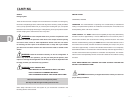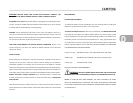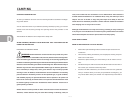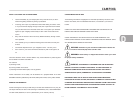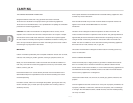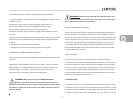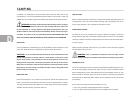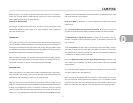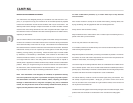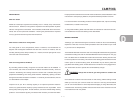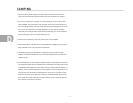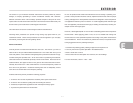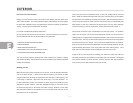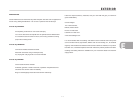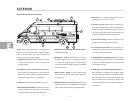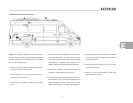
D
CAMPING
D - 9
EFFECTS OF PROLONGED OCCUPANCY
Your motorhome was designed primarily for recreational use and short-term occu-
pancy. If you expect to occupy the motorhome for an extended period, be prepared
to deal with condensation and the humid conditions that may be encountered. The
relatively small volume and tight compact construction of modern recreation vehicles
mean that the normal living activities of even a few occupants will lead to rapid mois-
ture saturation of the air contained in the trailer and the appearance of visible moisture,
especially in cold weather.
Just as moisture collects on the outside of a glass of cold water during humid weather,
moisture can condense on the inside surfaces of the motorhome during cold weather
when relative humidity of the interior air is high. This condition is increased because
the insulated walls of a recreation vehicle are much thinner than house walls. Estimates
indicate that a family of four can vaporize up to three gallons of water daily through
breathing, cooking, bathing, and washing. Unless the water vapor is carried outside
by ventilation, or condensed by a dehumidifier, it will condense on the inside of the
windows and walls as moisture, or in cold weather as frost or ice. It may also condense
out of sight within the walls or the ceiling where it will manifest itself as warped or
stained panels. Appearance of these conditions may indicate a serious condensation
problem. When you recognize the signs of excessive moisture and condensation in
the motorhome, action should be taken to minimize their effects. For tips on control-
ling condensation see the “Tips To Controlling Condensation” section.
Note: Your motorhome is not designed, nor intended, for permanent housing.
Use of this product for long term or permanent occupancy may lead to prema-
ture deterioration of structure, interior finishes, fabrics, carpeting, and drapes.
Damage or deterioration due to long-term occupancy may not be considered
normal, and may under the terms of the warranty constitute misuse, abuse, or
neglect, and may therefore reduce the warranty protection.
To avoid condensation problems, try to follow these tips to help alleviate
excess moisture:
Allow excess moisture to escape to the outside when bathing, washing dishes, hair
drying, laundering, and using appliances and non-vented gas burners.
Always use the vent hood when cooking.
Keep the bathroom door closed and the vent or window open when bathing and for a
period of time after you have finished.
Do not hang wet clothes in the trailer to dry.
In hot weather, start the air conditioner early as it removes excess humidity from the air
while lowering the temperature.
Keep the temperature as reasonably cool during cold weather as possible. The warmer
the vehicle, the more cold exterior temperatures and warm interior temperatures will
collide on wall surfaces, thus creating condensation.
Use a fan to keep air circulating inside the vehicle so condensation and mildew cannot
form in dead air spaces. Allow air to circulate inside closets and cabinets (leave doors
partially open). Please keep in mind that a closed cabinet full of stored goods prevents
circulation and allows the exterior temperature to cause condensation.
The natural tendency would be to close the vehicle tightly during cold weather. This
will actually compound the problem. Simply put, you need to remove some of the
warm air, and allow some cool outside air to get inside the vehicle, so the furnace will
not recycle the humid interior air.
Use fluorescent ceiling lights and minimize prolonged use of incandescent lights, which
produce heat and contribute to condensation in the roof above the ceiling lights.



